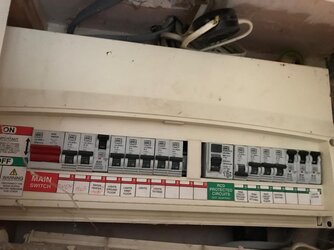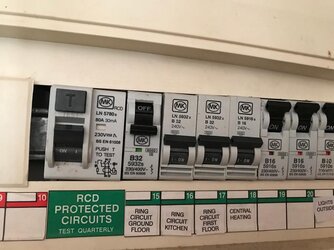I’ve a fuseboard as pictured, which has been nuisance tripping on the downstairs ring final circuit. It started off with 32a breaker tripping which is RCD protected, and now it’s tripping the Main RCD switch.
This is a relative's property and he’s already had an electrician in, who’s ran a series of tests (unsure of which) and replaced the 32a MCB but it hasn’t resolved the problem.
The longest its gone without tripping was 3 weeks and it seems to trip most between 9-10am and the last time it tripped there was no appliances being used. Now that the main RCD switch is tripping, it only stays on if the previously mentioned 32amp breaker is switched off and this is with everything on it unplugged.
I’m going to take a look to put some fresh perspective on it. I’m going to open up the affected sockets to see if there’s anything obvious, and if nothing is visible carry out an IR test on the cables to determine their condition. I don’t do much fault finding nowadays so any further advice would be appreciated.
This is a relative's property and he’s already had an electrician in, who’s ran a series of tests (unsure of which) and replaced the 32a MCB but it hasn’t resolved the problem.
The longest its gone without tripping was 3 weeks and it seems to trip most between 9-10am and the last time it tripped there was no appliances being used. Now that the main RCD switch is tripping, it only stays on if the previously mentioned 32amp breaker is switched off and this is with everything on it unplugged.
I’m going to take a look to put some fresh perspective on it. I’m going to open up the affected sockets to see if there’s anything obvious, and if nothing is visible carry out an IR test on the cables to determine their condition. I don’t do much fault finding nowadays so any further advice would be appreciated.










